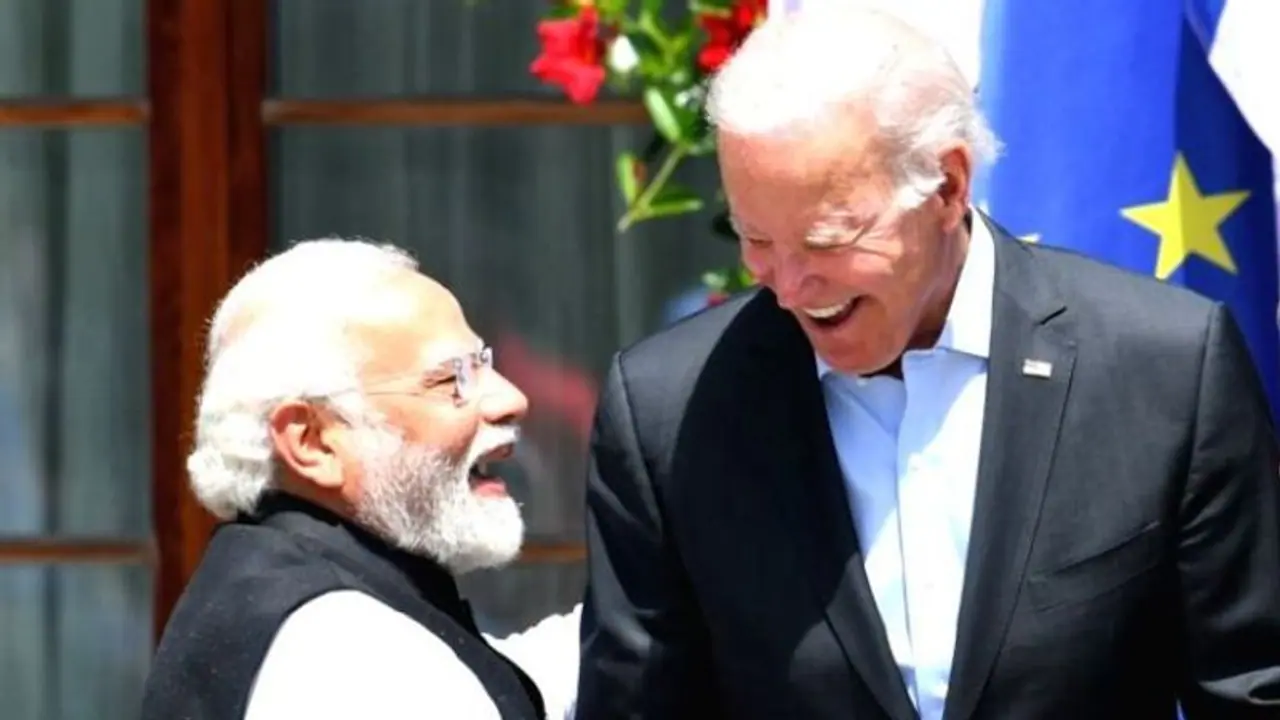Americans know that only India has the potential and capabilities to contain the growing aspirations of China. Moreover, the US and India know that as a nation, they cannot trust the Chinese smile, say experts
In a major shot in the arm for the India-United States relationship, the US House of Representatives has passed a historic amendment to provide a waiver to India under the Countering America's Adversaries Through Sanctions Act or CAATSA, mooted by Indian-American Congressman Ro Khanna.

Also Read: China's economy shrinks 2.6 per cent; experts say it won't meet growth targets
The CAATSA is slapped on countries considered adversaries to Washington and those nations that deal with its adversaries. To date, Iran, North Korea and Russia are on the list of US adversaries.
What does it mean?
The amendment will affirm Washington's ties with New Delhi and urge the Joe Biden administration to use their authority to provide a CAATSA waiver to India in an effort to deter aggressors like China.
Representative Khanna said, "The US must stand with India in the face of escalating aggression from China. As Vice Chair of the India Caucus, I have been working to strengthen the partnership between our countries and ensure that India can defend itself along the Indian Chinese border."
"This amendment is of the utmost importance, and I am proud to see it pass the House on a bipartisan basis."
What does Ro Khanna's amendment say?
The US Congressman believes that a strong US-India defence partnership, rooted in shared democratic values, is critical in order to advance Washington's interests in the Indo-Pacific region.
The partnership between the two countries must continue to be strengthened in response to increasing threats in the Indo-Pacific regions, sending an unequivocal signal that sovereignty and international law must be respected.
Belligerent China on borders and dependence on Russia-made defence equipment. The House recognised these two issues and has urged the Biden administration to take additional steps to encourage India to accelerate its transition off Russian-built weapons and defence systems while strongly supporting India's immediate defence needs. The Representatives believe that the CAATSA waiver would be beneficial for both countries. The waiver has been sought for a transition period to deter aggressors in light of Russia and China's close partnership.
What do experts have to say about it?
Asianet Newsable spoke to a number of experts to understand the step taken by the US House of Representatives amidst the ongoing Russia-Ukraine war. The experts have appreciated the move, saying that the US has never considered India as its adversary, particularly after the cold-war period.
Professor Vijay Kumar Verma, Associate Professor of Political Science and International Relations at the University of Delhi's Dayal Singh College, said, "The United States had learned the biggest and the bitter most lessons from the sanctions it had imposed after the Pokhran-2 nuclear test in May 1998 during Atal Behari Vajpayee's prime ministership. For good or bad reasons, the US learned that it could not afford to ignore India's huge market potential and opportunities. Moreover, the pro-Indian lobby among the US legislators is very much organised, strong and vocal."
Verma believes that the Joe Biden administration knows the dynamics of power relations and the significance of --- check and balance theory and is also aware of the conflicting aspirations of both China and India.
"They know the dynamics of power relations and the significance of check and balance theory. Americans know that only India has the potential and capabilities to contain the growing aspirations of China. Moreover, the US and India know that as a nation, they cannot trust the Chinese smile," Dr Vijay Verma.
"India has also never tried to go against the American interest in any way. India's non-aligned stand in the context of the Russia-Ukraine was also taken in the right perspectives by the US," Dr Vijay Verma added.
He further stated that the Americans are prudent and professional businessmen. "They know the greatest challenge for a mighty nation is to remain mighty forever. They also know that in this ruthless world, every relation is a power and interest (primarily business interest in terms of trade and market) relation."
Regarding India's procurement of air defence systems from Russia, defence expert Major General Ashok Kumar (R) said that the Biden administration had warned India of imposing CAATSA sanctions.
"India still went ahead to purchase the air defence systems from Russia based on its security needs, especially against China. In the meantime, mutual cooperation between India and the US enhanced as never before, especially after the formulation of the QUAD. Also, the US became more understanding of the Indian position during the Russia-Ukraine war," Maj Gen Ashok Kumar (R) said.
"In the NATO Summit concluded on June 30 in Madrid, for the first time, they acknowledged the Chinese challenge to international security. The US is conscious of the fact that they need India more than ever before to checkmate China," the defence expert said.
It is towards this that the US has taken a positive step wherein India-specific legislation has been moved to grant a waiver to India from CAATSA sanction on the issue of procurement of S-400 missile defence systems from Russia, he said.
This legislation will now allow the Biden administration to waive off India from impending CAATSA, thus narrowing down the fault line on this count, the defence expert added. Over the new development, he believed that China should take note of this and resolve the LAC standoff during a forthcoming meeting scheduled on July 17.
Also Read: 'Politicians only want power... Big Brother India must help'
